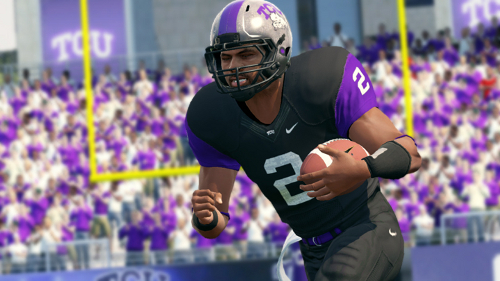NCAA and EA Will Get Opportunity to Argue for Dismissal from Likeness Lawsuit

The judge in the potentially monumental antitrust case regarding college broadcasting, merchandising, and video game revenue through the use of unpaid player likenesses will allow both the NCAA and Electronic Arts to seek dismissal as defendants. The two parties felt they had a right to this due to the plaintiffs continuing to amend their claims (the latest by bringing in current players) and judge Claudia Wilken will grant them that opportunity in order to prevent a potential point for an appeal down the line.
It would be shocking if either party were released at this point. The NCAA has no shot at it but want the formality and delay it creates. EA actually was dismissed from the lawsuit in 2011 only to be brought back in three months later but the case against them has strengthened since. The CLC has not requested a hearing for dismissal.
The class action certification ruling continues to be pushed back as developments occur. That could still come later this month and would mark the biggest moment in the whole ordeal no matter which way the decision goes. Wilken denied a delay to the trial date of 15 months by the NCAA and 5 months by EA and the CLC. It is still slated to begin next June.
EA has also announced they will be appealing related cases that have been lost to the Supreme Court. The most recent had been the argument that the First Amendment gave them protection as free expression and artistic works in the representation of players in college video games similar to that of other forms of media like movies. The 9th Circuit Court of Appeals in California, which ruled 2-1 against EA, is overturned 78% of the time by the Supreme Court.
Earlier/Summary Below
The player likeness lawsuit against the NCAA, CLC, and Electronic Arts is the culmination of two high profile filings that were combined as led by Sam Keller and Ed O’Bannon (and O’Bannon now heads it up). It alleges improper use of player likeness through various forms of merchandise and media including video games in which the parties in question conspired to avoid paying players for their rights. Some interesting details and claims regarding the case at hand were revealed when EA was reentered as a defendant after initially being dismissed.
EA originally won a previous case regarding player likeness with the courts ruling video games are artistic works rather than commercial speech and therefore protected by the First Amendment. The Supreme Court in 2011 established forms of media, producing expressive works of art, are not subject to judgments based on incorporating someone’s name or likeness. That dismissed case however, involving Ryan Hart, has resurfaced after an appeals court reversed a decision based on that argument.
Recent uncovered emails have shown that NCAA representatives were well aware that players in games were based off real-life players. At one point the NCAA and EA had nearly reached an agreement to have actual player names included in the products. The EA Locker / Roster Share feature was a fallback option. With momentum clearly on the plantiffs’ side NCAA reps have begun to publicly express concern over the future of collegiate sports. A former EA Sports producer admitted players in NCAA games were based off real athletes.
The discovery of Tim Tebow’s name being in NCAA Football 10 could throw another wrench into EA’s series of arguments. Depositions from former Alabama wide receiver Tyrone Prothro and UConn basketball guard Tate George support the defendant’s reasoning for denying class action certification. The class action hearing resulted in the judge heavily questioning the legitimacy of a potential class and insisting a current athlete be involved. The judge required current athletes be added as plaintiffs for that party to have representation if the case is certified as class action. Six current college football players were added as plaintiffs in mid-July.
EA is now arguing to be dismissed as a defendant in the suit. A major defense for the company however was recently struck down by an appeals court.
This consolidated case in California if certified as class action would go to trial – barring a settlement – and ultimately be the determining factor of how the NCAA proceeds in the future handling broadcasting rights, merchandising, and video games. Should a negative result come down, which one analyst has pegged as being a potential loss of $1 billion for EA, it would likely not just end the NCAA Football series but also with it any realistic possibility of college sports games being made in the future. The trial now is slated to begin June 9, 2014. Appeals following a decision could extend the fight through 2020.
